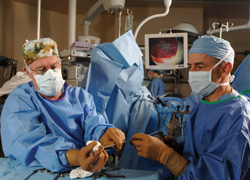Division of General Surgery and Gastrointestinal Surgery
 The Division of General Surgery is a recognized regional leader for complicated general surgery, advanced minimally invasive abdominal surgery, colorectal surgery, and pancreatic surgery in addition to offering care for a variety of basic general surgical problems. In addition, among our eight surgeons we offer diagnostic and therapeutic colonoscopy and upper endoscopy. We provide surgical leadership in a multi-disciplinary Digestive Disease Center as well as participating in the care of patients in our multi-disciplinary Continence Center. Our Bariatric Surgery Center is accredited by the American College of Surgeons and offers an array of procedures for bariatric care.
The Division of General Surgery is a recognized regional leader for complicated general surgery, advanced minimally invasive abdominal surgery, colorectal surgery, and pancreatic surgery in addition to offering care for a variety of basic general surgical problems. In addition, among our eight surgeons we offer diagnostic and therapeutic colonoscopy and upper endoscopy. We provide surgical leadership in a multi-disciplinary Digestive Disease Center as well as participating in the care of patients in our multi-disciplinary Continence Center. Our Bariatric Surgery Center is accredited by the American College of Surgeons and offers an array of procedures for bariatric care.
Education
The Division of General Surgery has a strong commitment to the education of medical students and residents as well as our attending colleagues. Our surgeons have a strong track record of excellence in teaching, and have received numerous teaching awards from medical students and residents. We have developed curricula for minimally invasive and endoscopic surgery simulation for our residents in addition to basic bedside teaching and lectures. For more than twenty years we have offered an annual CME course, Current Concepts and Controversies in Surgery, which has been very well received with a high proportion of participants who return on a yearly basis.
Research
Our surgeons are involved in a number of multi-institutional clinical trials. Many of these are done through the Vermont Regional Cancer Center, of which we are a member, with studies dealing with colorectal cancer and pancreatic cancer. We also participate in a number of industry funded studies dealing with topics such as prevention of post-operative ileus and use of contrast enhanced endoscopic ultrasound to evaluate vessel involvement by pancreatic tumors. While we currently have no active basic science research, we have participated in a number of collaborative studies with basic science colleagues studying GI motility and hosts responses to sepsis, and we are planning further collaboration in the near future. A number of studies are currently in progress evaluating our educational programs.